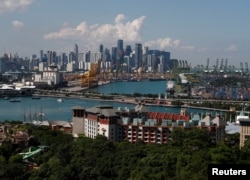In Singapore, U.S. Vice President Mike Pence has offered the Trump administration’s support for Southeast Asia’s digital and urban infrastructure development. In his remarks at the U.S. ASEAN Summit, Pence announced the new “U.S.-ASEAN Smart Cities Partnership.”
“This effort will spur renewed American investment in the region’s digital infrastructure, advancing prosperity and security in Southeast Asia,” Pence said, adding that it will enhance Washington’s cooperation on cybersecurity with the regional bloc.
Smart Cities is a buzzword among ASEAN member countries as they face two mega trends, urbanization and digitalization. Southeast Asian nations are rapidly increasing in population, and a large portion of their people are gravitating toward cities, creating multiple challenges ranging from traffic congestion, water and air quality, to digital security.
WATCH: Pence Announces ‘US-ASEAN Smart Cities Partnership'
Speaking to reporters, Pence called ASEAN an “extraordinary part of the world filled with remarkable people” and highlighted the administration’s desire for greater economic engagement with the regional bloc. He said the U.S. has only “begun to explore the way that our investments and the economies of this region can contribute to growth and jobs and opportunity in the United States.”
ASEAN smart cities network
Singapore, as the chair of ASEAN, proposed the creation of a network of 26 Southeast Asian smart cities in April 2018. The country is known for being very innovative in terms of incorporating digital technology in urban planning, and other Southeast Asian nations are eager to emulate that success.
The ASEAN Smart Cities Network is envisioned as a collaborative platform where up to three cities per ASEAN country work toward a common goal of smart and sustainable urban development that maximizes digital technology.
Tan Chee Haw, Singapore’s chief Smart City officer explains the three pillars with which digital technology will improve the lives of citizens. One is the digital economy, which is about “creating a vibrant and innovative digital economy that can create new jobs, opportunities to help people and businesses.” Second is the digital government concept, to transform the way that governments deliver services that is “citizen-centric.” The third is “digital society” which focuses on ensuring all segments of the population to be digital ready and can benefit from these initiatives.
US technology and innovation
The United States is still seen by the region as a leader in innovation and a natural partner in the smart cities initiative.
“The most advanced technologies do come from the U.S.,” said Lim Tai Wei, senior research fellow at the East Asian Institute, National University of Singapore. ASEAN countries would like to know how “they can work with American companies and partners in order to strengthen ASEAN’s position as a network of smart cities,” he said.
The partnership will offer opportunities for American companies to develop urban digital infrastructure ranging from payment mechanisms to smart transit systems.
The head of Southeast Asia for the consultancy group Control Risks, Angela Mancini is skeptical on how much the United States can actually offer, considering “it has its own challenges with infrastructure and technology.”
Free and open Indo-Pacific
The Smart Cities Partnership is part of what Pence said is proof of the U.S. commitment to the Indo-Pacific region, which he calls “steadfast and enduring.” He stressed that Washington “seeks collaboration, not control, and we are proud to call ASEAN our strategic partner.”
On the security front, Pence stressed Washington’s commitment to “uphold the freedom of the seas and skies, where we stand shoulder to shoulder with you for freedom of navigation and our determination to ensure that your nations are securing your sovereign borders.”
Pence said the Free and Open Indo-Pacific vision “excludes no nation.” However, a big part of the strategy is aimed to protect freedom of navigation, particularly in light of China’s territorial ambitions in the South China Sea. "We all agree that empire and aggression have no place in the Indo-Pacific," he said.
Pence said the Free and Open Indo-Pacific vision “excludes no nation.” However, a big part of the strategy is aimed to protect freedom of navigation, particularly in light of China’s territorial ambitions in the South China Sea.
Stephen Nagy, professor of politics and international studies at International Christian University in Tokyo, believes the Trump administration has stepped up its military commitment to the region. Nagy said, “I do think there’s a lot of evidence that the United States will make a bigger commitment.”
The U.S. government will want “partnerships,” he said, and Australia and Japan are “increasing their burden” to ensure the United States is not only the one helping ASEAN’s security.
An urban region
The United Nations reported that two-thirds of the world’s population will live in cities by 2050. Already home to 53 percent of the world’s urban population, Asia will see this proportion expand to 64 percent by 2050.
The 26 Southeast Asian pilot smart cities are Bandar Seri Begawan, Bangkok, Banyuwangi, Battambang, Cebu City, Chonburi, Da Nang, Davao City, DKI Jakarta, Hanoi, Ho Chi Minh City, Johor Bahru, Kota Kinabalu, Kuala Lumpur, Kuching, Luang Prabang, Makassar, Mandalay, Manila, Naypyidaw, Phnom Penh, Phuket, Siem Reap, Singapore, Vientiane, and Yangon.
VOA's Nike Ching, Ahadian Utama and Ralph Jennings contributed to this report.







